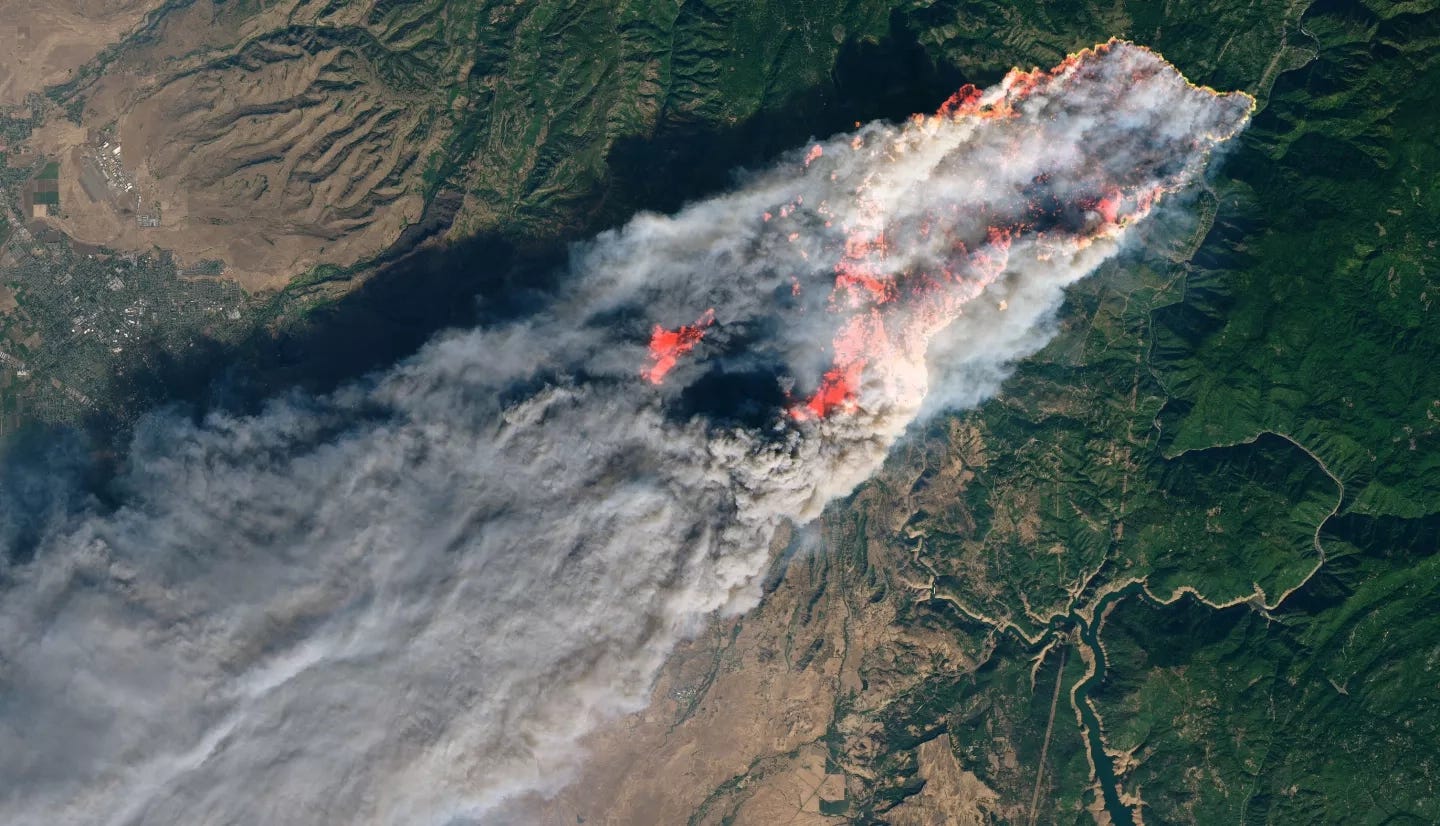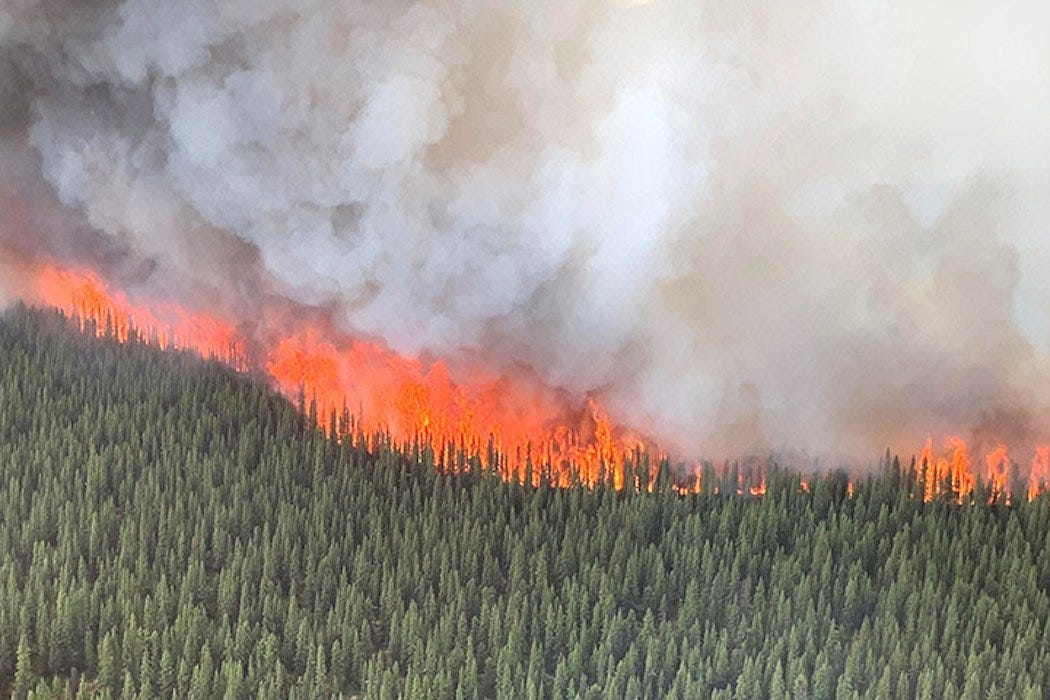The Burning Bush
A Spiritual Reckoning with Colorado's Marshall Fire
Wherefore, the righteous need not fear; for thus saith the prophet, they shall be saved, even if it so be as by fire. -1 Nephi 22:17
Overgrown juniper is at best unattractive. Most people don’t realize that it’s also a fire hazard. While juniper is popular in residential landscaping, thanks to its drought-resistance and low maintenance, it’s especially likely to burn due to its foliage, dead wood, and oils. This is problematic when such shrubs are located merely feet away from houses, decks, and wooden fences. My community learned this the hard way when, on December 30, 2021, winds reaching over 100 miles per hour drove a brushfire through Boulder’s neighboring suburbs, resulting in Colorado’s most destructive wildfire. Some members of our stake lost homes. Everyone lost sleep. Junipers ignited, potentially contributing to the uncontrolled spread. My subdivision was spared the fire but not the trauma. I watched homes become smoke from my deck.
And that’s why I’m eyeing my neighbor’s juniper, envisioning for the hundredth time what might happen when the grass sparks next.
Six months before the fire, U.S. News & World Report ranked Boulder, CO the best place to live in America. Calling Boulder a snug and cradled enclave and referencing its famous Flatirons mountains, U.S. News plays into a fantasy Boulder has carefully cultivated: that the Boulder “bubble,” as residents call it, represents a political, educational, and environmental haven from state and national problems. The stereotypes are partly true. With people lower on the income scale largely priced out, Boulder is dotted with electric vehicles, solar panels, outdoor recreation shops, yoga studios, organic grocery stores, and an extensive trail system. Persons who don’t conform to its healthy (and white) image are largely invisible in the narrative. Boulder has one of the highest percentages of PhDs in the country, thanks to the allure of its university, federal research institutions, and technology companies. This fantasy is so impenetrable that even after the fire, U.S. News only demoted Boulder to number four.
The “Boulder bubble” is more than a feeling or metaphor: it’s a physical barrier that Boulder residents intentionally engineered. Central to Boulder’s current identity and design are limitations on growth. In 1959, residents enacted a “blue line” above which the city could not supply water in order to prevent growth in the surrounding mountains. Soon afterwards, residents encircled the city with a greenbelt and capped housing growth. These measures preserved Boulder’s scenic beauty but at a cost to future residents and arguably the environment. The greenbelt that makes Boulder property so valuable now also feels like a liability. For locals, the bubble burst when the Marshall Fire swept over Route 36 destroying over 1,000 homes and damaging businesses in Boulder County and Boulder’s neighboring cities, Louisville and Superior. Not even the Tesla service center escaped damage.
My family moved to Boulder in 2015, when it was expensive but not impossible to afford an aging house on a tenured academic’s salary and some savings. We were not immune from the greenbelt’s pull. We bought our house after only a Zoom tour, reflecting the desperation we felt to secure a foothold for our children in Boulder’s outstanding schools as well as the notion that proximity to the Flatirons (and the pristine canvas they represented) compensated for the house’s deficiencies. Access to the Flatirons justified our decision to live in Boulder when we discovered that the house lacked wall insulation; when families left the ward, often because housing costs increased and older children could no longer afford to return home; when the pandemic meant that our child did not attend in-person the schools for which we bought the house.
We repaired the house. We hiked and breathed in open space when indoor activities shut down. We expressed gratitude for a detached home during the pandemic. We reassured ourselves that our kids would be fine without attending school in-person for a year, since they had good genes and would eventually attend school with the offspring of professors and Google engineers. We clung to the safety of our walls when a mass shooting killed ten people at the local grocery store. We listened via Zoom as ward members recounted the last-minute decisions that saved them from shopping that day. We pretended that we could work harder, network harder, pray harder, and build our house stronger in order to protect ourselves from the violence outside. But we couldn’t maintain this fantasy after the Marshall Fire. We couldn’t maintain it after we were forced to evacuate only a few weeks later due to another fire—this one merely yards away from the edge of our neighborhood.
I look at the open space near our house and see tinder. I look at pine trees touching roofs and see fuel. I look at cedar fences and see fiery pathways. I search Zillow, scan fire maps, and read news articles about natural disasters, anxious to move or mitigate to avoid the next fire. But the facts are bleak: climate change has plunged the American West into its worst drought in over a millennium. Projections show serious risk that Lake Powell will sink below the threshold needed to generate hydropower. Bodies are emerging from the bottom of Lake Mead. Las Vegas is tearing out its grass. Nearly every state in the West faces increasing wildfire risk. Globally, wildfires in Australia, flooding in Europe and Pakistan, and heat waves in India suggest the new, deadly normal under climate change.
While I felt abandoned as a parent of young children during the pandemic, I still had relative control over my family’s exposure to risk. I doubled down on my decision to take actions I perceived as responsible, confident that my individual sacrifices could reduce our danger. When we felt unsafe attending church in person, I found solace in Book of Mormon stories about lonely prophets who followed the Lord and their consciences while their families, governments, and churches collapsed around them. But wildfires are different. And I don’t want to be a lonely prophet. I don’t want our story to end in destruction. I can remove my conifers and replace my wooden fence, but there are hundreds of evergreens, junipers, and fences in my neighborhood. My actions alone will not save our house in a fire. Reducing the risk requires costly and continuous neighborhood action as well as policies to address climate change.
From my home in Colorado, it now seems probable rather than metaphorical that the world will end in fire. The pandemic proved that adopting the communitarian outlook needed to mitigate climate change is unlikely. Might it take a world on fire to finally love our neighbors as ourselves and give up the material things we don’t need for our collective salvation? Could the Lord build Zion from its ashes and refine us with fire? Or cleanse the earth with a flood? My body is too engulfed by anxiety to hear a still small voice in the aftermath of successive environmental disasters, yet I don’t think God is distant. Rather, the warning resounds through the charred landscape that we must be better stewards of the earth and of each other. We cannot become gods and goddesses of new worlds if we cannot make the sacrifices needed to save this one.

The earth binds us, internationally and intergenerationally. Its surface and its cities encode the choices we and our foreparents have made or have had forced upon them: decisions about what we (or others) want, what we (or others) need, and what we (or others) share or do not share. Its condition is the traces of human agency and values—choices that have led too often to scarred landscapes and segregated cities. It's a physical parallel to our spiritual choices that should give us pause as it reminds us that in our selfishness, we have failed to bring forth good fruit.
I offer to help my neighbor remove the juniper. There shall be no more hedges between us.
Natalie Brown writes regularly about housing, nineteenth-century literature and Mormonism. Her writing has appeared in The Rambling, By Common Consent, and Dawning of a Brighter Day.







A sobering account, Natalie. I'm rethinking my own housing choices in its wake.
Very good article!